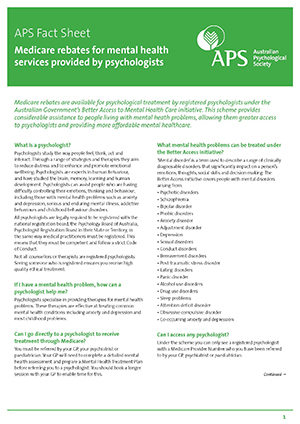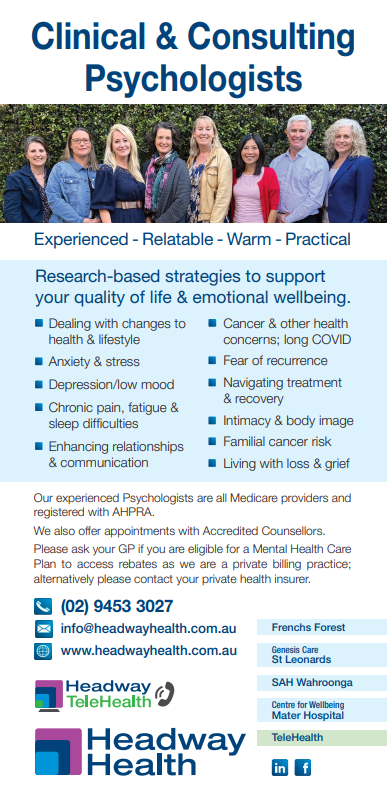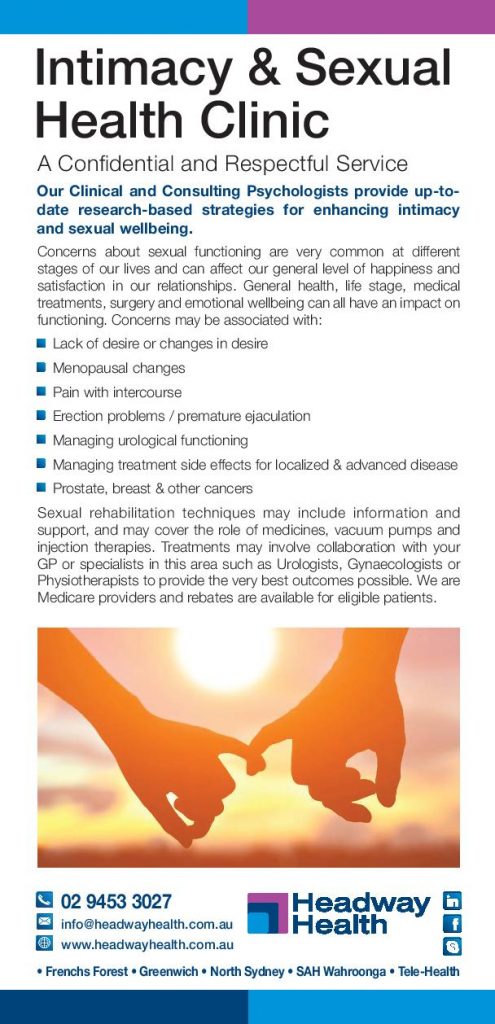About Clinical and Consulting Psychologists
A Psychologist has studied psychology which examines the scientific knowledge base of human development, the functioning of the brain, memory and learning. They have developed an understanding of the range of complex factors that affect how people feel, think and behave – their thoughts, beliefs, emotions, actions, biology, and environment. This training enables Psychologists to design and deliver individualised interventions to identify and address common psychological concerns.
Psychology interventions are evidence based: these are approaches that are supported by evidence, such as Cognitive Behaviour Therapy (CBT) and Mindfulness based skills. Evidence-based therapies have been evaluated in research trials, and/or draw on psychological theories that are supported by research. Evidence shows that psychological treatments can be effective for supporting people with cancer and many psychological disorders. Psychological consultations can also be effective for people who do not have a psychological disorder, but would like to enhance their well-being, performance, or quality of life.
Research evidence supports a range of interventions that are based on non-drug therapies.
Consulting Psychologists have completed undergraduate training and Honours research in Psychology followed by two years of supervised clinical practice within a structured Registration program. They may also hold other qualifications and training certificates that contribute to the skills they provide.
Clinical Psychologists have completed an undergraduate and Honours research, followed by a Masters or Doctorate in Philosophy in Clinical Psychology, equating to a total of six years of full-time university level training.
Medicare supports contact with Consulting Psychologists and Clinical Psychologists to increase access to mental health care services for eligible patients. Consulting and Clinical Psychologists must be registered with The Psychology Board of Australia through the Australian Health Practitioner Regulation Agency (AHPRA) to allow them to provide psychological services through Medicare. For a register of current members it is advisable to search the official website at www.ahpra.gov.au.
Information on accessing interventions through Medicare is provided in the following resource sheet:
The Australian Psychological Society (APS) is the peak body that regulates and manages the psychology profession. A clinician must meet certain requirements to become a Member of APS (MAPS) and use the title Clinical Psychologist or Psychologist (see link). Clinical Psychologists with specialised clinical expertise may apply to become a member of the College of Clinical Psychologists, APS. This typically involves a further two years of supervised practice to apply for membership of the College of Clinical Psychologists.
Ongoing professional development is an essential requirement of practice. Psychologists are required to participate in regular professional development to ensure up-to-date knowledge and the very best delivery of interventions and services.
All our Consulting and Clinical Psychologists abide by the Australian Psychological Society Code of Ethics and Australian Psychological Society Ethical Guidelines which include rules regarding confidentiality and all aspects of professional practice (see Client Charter). HeadwayHealth’s clinicians are all registered health practitioners with the Australian Health Practitioner Regulation Agency (AHPRA). Only practitioners with the relevant qualifications can call themselves a Psychologist; titles such as ‘therapist’ and ‘counsellor’ are not bound by these regulations but may have their own requirements.
My Health Record (MHR)
My Health Record is a summary of your medical information. To learn more about how this will allow you to keep track of your health information as well as your rights please visit:
https://www.myhealthrecord.gov.au or contact their Help Line on phone: 1800 723 471.
You may wish to consider this information in relation to your emotional wellbeing and discuss this with your clinician and health care providers. A number of Information Fact Sheets on privacy are provided, for example:
Tips to protect your privacy — OAIC
Detailed information is provided on how to opt out and control access to information on My Health Record, for example: https://www.myhealthrecord.gov.au/for-you-your-family/opt-out-my-health-record
It is advised that if you are affected by family and domestic violence, you can take steps to control the information in your My Health Record:
https://www.myhealthrecord.gov.au/for-you-your-family/howtos/family-and-domestic-violence
The Headway Health group practice does not utilise software that allows its group of clinicians to upload information onto My Health Record, however you will need to discuss with your GP, specialists and other members of your care team any information they may share and upload regarding your emotional and physical health. You may also wish members of your care team to view your My Health Record and to do this they will need to be registered as a Health Practitioner with their own unique access number.
Please visit the MHR website if you would like more information on who and how your care team can work with you to manage your MHR: https://www.myhealthrecord.gov.au
Making an appointment is simple
- Call us and book an appointment. We will match you to the most suitable clinician with the earliest appointment.
- We will explain payment options with Medicare, private health insurance, and private payment. If you wish to explore your eligibility for Medicare assistance, please ask your GP. Your GP will write a referral letter and complete a Mental Health Care Plan for you to bring to the appointment.
- We will send you further information about our clinics and endeavour to answer all your questions before your appointment.
What to expect at your appointment at HeadwayHealth
Your Psychologist will work with you to identify your concerns and develop strategies to deal with these. Strategies involve non-drug techniques and interventions typically last 3 to 10 sessions; sessions are spaced according to your need.
It can be helpful to list your goals before you come along to the first appointment, to help you and your clinician formulate an intervention plan. Your intervention plan may involve further contact with your clinician, as well as information and links to other services and resources that may be of assistance.
Most people approach a Psychologist because they are keen for change in their life. These changes may concern managing with health changes, emotional issues, such as improving well-being, gaining confidence, reducing distress, anxiety, or anger, and managing moods. Changes may also concern more practical issues, such as enhancing performance at work or home, improving relationships, changing habits, or making the most of your abilities and potential. Your clinician will work with you to identify and understand the complex factors which affect your life, goals and change, and then work with you to develop helpful ways to deal with life stresses and achieve your goals and desires.
This may include problem solving, living a life in line with your values and altering unhelpful patterns of thoughts or behaviours to create new more adaptive, helpful strategies. Intervention aims to develop and refine your skills to equip you to be confident in navigating challenges that you may face.
The length and frequency of contact varies and will depend upon your situation, goals, and your resources available to invest to best meet your goals. We aim to be practical and solution-focused; expectations for contact will be regularly discussed with your clinician. Many clients will identify their main concerns and goals in the first appointment and a proposed intervention plan will be discussed with their clinician. This may involve a number of regular appointments to develop particular skills, with appointments becoming more spaced over time as the client practices and consolidates changes. We do understand that personal situations may change, and appointments may be spaced more closely or apart to best meet your needs.
We care about your wellbeing and how you are responding to our interventions. We will ask you questions about your wellbeing before we meet, during your care, and at the end of treatment. We use questions from the Depression Anxiety Stress Scales which will either contain a list of 10 or 21 questions to help us to understand emotional responses associated with depression, anxiety and stress. We would like to measure changes over time (eg. in the course of treatment), so please look out for emails or SMSs from HeadwayHealth containing a list of questions. Your clinician will discuss your responses with you to help you to keep track of how you are traveling. (With thanks to: Halford & Frost, Benchmark Psychology, University of Queensland).
Our service and professional conduct is detailed in our Client Charter.
Is there any help available with the fees?
Medicare may be able to help. Please ask your doctor / general practitioner (GP) if you are eligible for a GP Mental Health Plan. This document authorises Medicare to rebate (or refund) a large portion of the appointment fee (typically 6 to 10 clinician sessions). If you are eligible for a GP Mental Health Plan, please bring this document and your GP letter of referral, to the first appointment with your clinician.
For more information on accessing services through Medicare MBS please click here
Private health funds also provide rebates depending upon your policy, but both rebate systems cannot be used together.
Concession fees are also offered for Pensioner Concession Card holders, Health Concession Card holders and Department of Veteran Affairs Gold Card Holders.
Please be advised that we are not a Bulk Billing service and alternative services may be available in the public health system.
Medicare Safety Net
Medicare provides the Medicare Safety Net scheme to help with out-of-pocket costs. The Medicare Safety Net is designed to assist high users of health services from large out-of-pocket expenses. For more information on the Medicare Safety Net, go to: www.medicareaustralia.gov.au.
For those who qualify for the Medicare SafetyNet a large portion, up to 80% of the out-of-pocket cost of out of hospital fees may be covered. Eligibility entitlements may change so please check thresholds for a person/family and pensioners/health care card holders, and whether thresholds are irrespective of income.
Click to view the Australian Department of Human Services.
Private Health Fund Member?
If you are a member of a private health fund, you may be eligible for a rebate; please note that if you are receiving a private health fund rebate, the Medicare rebate facility cannot be accessed as well; the Medicare rebate and a private health fund rebate cannot be used together.
Terms and conditions for access to benefits from private health funds vary dependant upon your level of cover; usually you would need to be covered by “ancillary benefits insurance” or an “extras table”. Some private health funds require a medical referral and may only offer a rebate for a visit to a Recognised Provider (for example a psychologist approved by them). For further information, please contact your private health fund directly or visit The Australian Psychology Society.
It may also be helpful to discuss managing your medical expenses with your financial adviser or accountant.
Our Clinics
In addition to general practice Clinical and Consulting Psychology services, HeadwayHealth offers more specific clinics. Please click on the links below for detailed information flyers:
Resources
HeadwayHealth offers a range of Tip Sheets, public education events and on-line resources with contributions from our team. Click here to learn more about our activities on our Resources page.
Also available are a wide range of resources that may provide you with helpful information and tools (e.g. self-help books, websites, SMARTapps etc.). Please click on the Resources tab to discover more.
HWH Service Relationships
Headway Assistance Program. Employee assistance program to support Melanoma Institute Australia, North Sydney NSW.
Preferred Psychology Service Provider, DEBRA Australia. DEBRA provides support for those living with Epidermolysis Bullosa (EB), a rare disease whereby the skin blisters and peels at the slightest touch. Living wth EB is very painful, and sufferers must be bandaged every day with dressings to protect and medicate their wounds. www.debra.com.au
Inpatient Psychology Services, rehabilitation ward services. Sydney Adventist Hospital, Wahroonga NSW. www.sah.org.au



